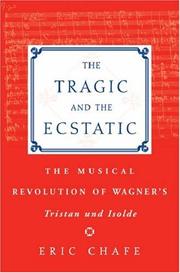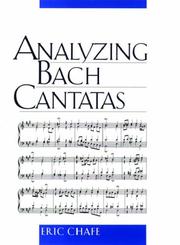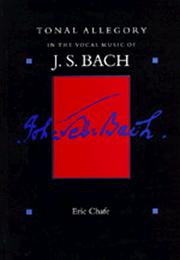| Listing 1 - 7 of 7 |
Sort by
|
Book
ISBN: 0028704959 9780028704951 Year: 1992 Publisher: New York Schirmer Books
Abstract | Keywords | Export | Availability | Bookmark
 Loading...
Loading...Choose an application
- Reference Manager
- EndNote
- RefWorks (Direct export to RefWorks)
Claudio Monteverdi's sixty-year compositional career spans one of the most crucial junctures in Western music. Laying the groundwork for harmonic tonality - the pervasive musical language of Western culture until the twentieth century - Monteverdi's break with the self-contained harmonic world of the Renaissance and his confident assertion of human rationality and order through music was a crucial contribution to the emergence of the Baroque style. Monteverdi's Tonal Language is a provocative new examination of the theoretical issues surrounding the emergence of early seventeenth-century tonality combined with systematic analysis of a wide range of Monteverdi's secular works. Eric Chafe argues that the composer's music was rooted in a strong sense of musical logic and a secure grasp of tonality combined with Monteverdi's assertion that music should be dominated by allegory Chafe offers a new framework for understanding the complex historical style and systematic features of the tona l language of Monteverdi's time and the composer's particular version of it. Building on Carl Dahlhaus's analysis of emerging tonality in Monteverdi's madrigals, Chafe expands the scope of the "modal-hexachordal" system rooted in the composer's work at the time of his fourth and fifth madrigal books. In addition to covering text-music relationships of a large and representative amount of Monteverdi's music, Chafe discusses several unexplored areas crucial to any understanding of the composer's tonal language. The two madrigals "Cor mio, mentre vi miro" (from Book Four) and "O Mirtillo" (from Book Five) illustrate the theoretical features of early seventeenth-century tonality. Chafe examines the pronounced sense of tonal clarity that distinguishes the Fourth Book of Madrigals, and he articulates the tonal styles Monteverdi used as organizing criteria in the Fifth Book. In subsequent chapters he demonstrates how the characteristic devices of Orfeo emerge as basic properties of the "modal -hexachordal" system, and discusses Monteverdi's creation of ordered reality in Il Ballo delle in grate and the "Lamento d'Arianna." He further argues that the Sixth Book symbolized the interaction of polyphonic madrigal and monody, and demonstrates convincingly that the Seventh Book was a milestone in Monteverdi's creative development, assuming the characteristics that marked his later tonal style. In the Eighth Book the composer set forth a manifesto for the allegorical nature of Baroque music; Il ritorno d'Ulisse un patria is a mature working out of the potential of tonal allegory. Finally in the last three chapters, Chafe discusses the tonal-allegorical framework, aspects of musical characterization, and questions of authenticity in Monteverdi's last opera, L'incoronazione di Poppea.
harmonie --- Monteverdi, Claudio --- Tonality --- Music theory --- History --- Monteverdi, Claudio, --- Criticism and interpretation --- History. --- Music --- Key (Music theory) --- Keys (Music theory) --- Musical key --- Musical intervals and scales --- Theory --- Criticism and interpretation. --- 78.21.1 Monteverdi --- 78.63 --- 78.68 --- Music theory - History - 17th century --- Monteverdi, Claudio, - 1567-1643 - Criticism and interpretation --- 17e eeuw --- Muziekanalyses --- Monteverdi, Claudio (1567-1643) --- Tonaliteit --- Monteverdi, Claudio, - 1567-1643

ISBN: 1280428295 9786610428298 0195346521 1423734165 1602565260 9780195346527 9781423734161 9781602565265 0199851921 9780199851928 0195176472 9780195176476 Year: 2005 Publisher: New York Oxford Oxford University Press
Abstract | Keywords | Export | Availability | Bookmark
 Loading...
Loading...Choose an application
- Reference Manager
- EndNote
- RefWorks (Direct export to RefWorks)
Covers the philosophical and literary underpinnings of Wagner's and Schopenhauer's story. This work explores Schopenhauer's metaphysics and Gottfried van Strassburg's Tristan poem. It turns to the events in the opera, providing tonal and harmonic analyses to reinforce its interpretation of the drama. It also creates an account of Ristan.
Music --- Hermeneutics (Music) --- Musical aesthetics --- Aesthetics --- Music theory --- Philosophy and aesthetics. --- Philosophy --- Wagner, Richard, --- Schopenhauer, Arthur, --- Shūpinhawar, Artūr, --- Шопенгауэр, Артур, --- Shopengauėr, Artur, --- Shu-pen-hua, --- Sopenaouer, --- Schopenhauer, Arturo, --- Schopenhauer, A. --- Schopenhauer, Artur, --- Шопенгауер, Артур, --- Shūpinhāvir, Ārtūr, --- Suʼu-pun-her, --- שאפענהויער, ארטור --- שאפענהויער, ארטור, --- שופנהאואר, ארתור, --- שופנהאואר, --- שופנהואר, ארתור --- شوپنهاور، آرتور --- شوپنهاور، أرثر --- شوپنهور، أرثر --- 叔本华, --- 叔本華,

ISBN: 0198028296 9786610470600 1280470607 1282367005 9786612367007 0195347552 1602568480 9780198028291 1423761642 9781423761648 9780195347555 019512099X 9780195161823 9780195120998 0195161823 0197727468 Year: 2000 Publisher: New York (N.Y.): Oxford university press
Abstract | Keywords | Export | Availability | Bookmark
 Loading...
Loading...Choose an application
- Reference Manager
- EndNote
- RefWorks (Direct export to RefWorks)
Bach's cantatas are among the highest achievements of Western musical art, yet studies of the individual cantatas that are both illuminating and detailed are few. In this book, noted Bach expert Eric Chafe combines theological, historical, analytical, and interpretive approaches to the cantatas to offer readers and listeners alike the richest possible experience of these works. A respected theorist of seventeenth-century music, Chafe is sensitive to the composer's intentions and to the enduring and universal qualities of the music itself. Concentrating on a small number of representative canta
Cantatas, Sacred --- Cantatas, Sacred (Mixed voices) --- Sacred cantatas --- Choruses, Sacred --- Analysis, appreciation. --- Bach, Johann Sebastian, --- Bach, Johann Sebastian --- Bach, Jean-Sébastien --- Harmony. --- Religion. --- Analysis, appreciation --- 526 --- Monografieën componisten --- Bakh, Iogann Sebastian, --- Bakh, Y. S., --- Bach, Jean Sébastien, --- Bach, G. S., --- Bach, Jan Sebastian, --- Bachas, J. S., --- Bach, J. S. --- Bahs, Johans Sebatjans, --- Pa-ha, Te, --- Bakh, Ĭ. S. --- Bakh, Ĭokhan Sebastian, --- Bach, Joh. Seb. --- Bakh, Yohan Sebasṭyan, --- Bach, Iohann Sebastian, --- Bahha, J. S., --- Bahha, Yohan Sebasutian, --- Bach, I. S., --- Bach, Juan S., --- Bach, John Sebastian, --- Bach, Giovanni Sebastiano, --- באך, יוהן סבסטיאן --- cantates --- Bach, Johann Sebastian, - 1685-1750. - Cantatas. --- Bach, Johann Sebastian, - 1685-1750 - Harmony. --- Bach, Johann Sebastian, - 1685-1750 - Religion. --- Cantatas, Sacred - Analysis, appreciation.
Book
ISBN: 9780199949502 9780199773473 0199773475 0199773475 0199949506 0199773343 9780199773343 9780199773343 0199773343 Year: 2014 Publisher: New York
Abstract | Keywords | Export | Availability | Bookmark
 Loading...
Loading...Choose an application
- Reference Manager
- EndNote
- RefWorks (Direct export to RefWorks)
'J.S. Bach's Johannine Theology' is a fertile examination of this group of fourteen surviving liturgical works. Renowned Bach scholar Eric Chafe investigates Bach's theology with the composer's St. John Passion, concentrating on its first and last versions.
Sacred vocal music --- Liturgical music --- Pastoral music (Sacred) --- Vocal music, Sacred --- Sacred music --- Vocal music --- History and criticism --- Bach, Johann Sebastian, --- John, --- Bach, Johann Sebastian --- Bach, Jean-Sébastien --- Giovanni, --- Hovhannēs, --- Ioann, --- Jan, --- Jean, --- Jehan, --- Johannes, --- Yūḥannā, --- Beloved Disciple --- Criticism and interpretation. --- Songs and music --- History and criticism. --- -78 BACH, JOHANN SEBASTIAN --- 783.3 --- 783.3 Oratoria. Passiemuziek. Cantates --- Oratoria. Passiemuziek. Cantates --- 78 BACH, JOHANN SEBASTIAN Muziek--BACH, JOHANN SEBASTIAN --- Muziek--BACH, JOHANN SEBASTIAN --- -History and criticism. --- Bakh, Iogann Sebastian, --- Bakh, Y. S., --- Bach, Jean Sébastien, --- Bach, G. S., --- Bach, Jan Sebastian, --- Bachas, J. S., --- Bach, J. S. --- Bahs, Johans Sebatjans, --- Pa-ha, Te, --- Bakh, Ĭ. S. --- Bakh, Ĭokhan Sebastian, --- Bach, Joh. Seb. --- Bakh, Yohan Sebasṭyan, --- Bach, Iohann Sebastian, --- Bahha, J. S., --- Bahha, Yohan Sebasutian, --- Bach, I. S., --- Bach, Juan S., --- Bach, John Sebastian, --- Bach, Giovanni Sebastiano, --- באך, יוהן סבסטיאן --- Cantatas --- Cantates --- Musique vocale sacrée --- Histoire et critique --- -History and criticism
Book
ISBN: 9780190217297 0190217294 Year: 2015 Publisher: New York (N.Y.) : Oxford university press,
Abstract | Keywords | Export | Availability | Bookmark
 Loading...
Loading...Choose an application
- Reference Manager
- EndNote
- RefWorks (Direct export to RefWorks)

ISBN: 0520058569 Year: 1991 Publisher: Berkeley University of California Press
Abstract | Keywords | Export | Availability | Bookmark
 Loading...
Loading...Choose an application
- Reference Manager
- EndNote
- RefWorks (Direct export to RefWorks)
Book
Year: 2005 Publisher: Oxford Oxford university press
Abstract | Keywords | Export | Availability | Bookmark
 Loading...
Loading...Choose an application
- Reference Manager
- EndNote
- RefWorks (Direct export to RefWorks)
| Listing 1 - 7 of 7 |
Sort by
|

 Search
Search Feedback
Feedback About UniCat
About UniCat  Help
Help News
News